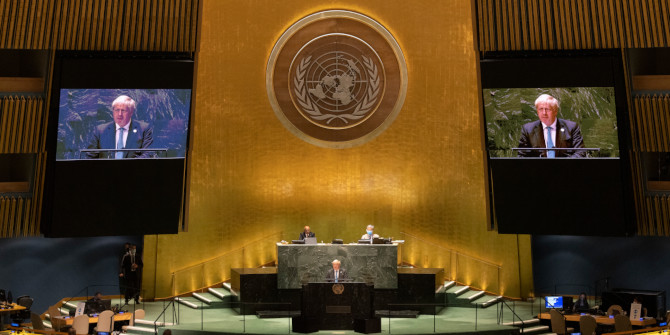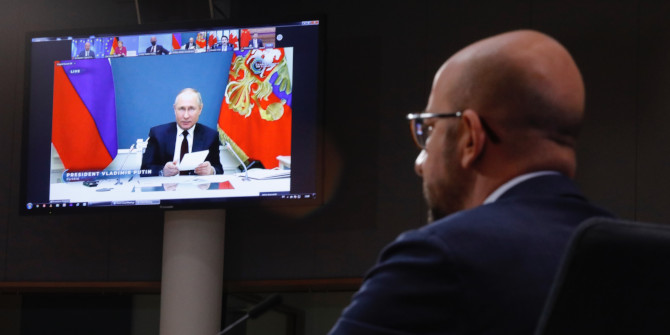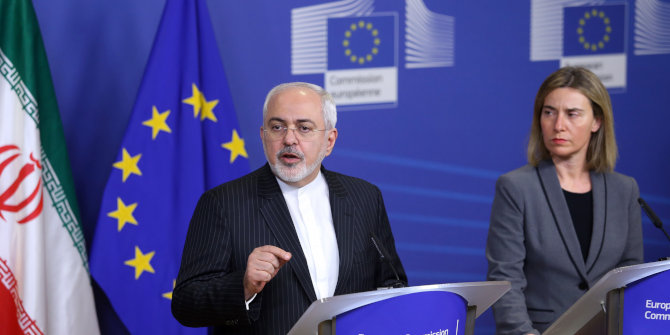Some progress has been made on strengthening LGBT rights in Bosnia and Herzegovina, Croatia, and Serbia over the last two decades, in part due to the requirements of the EU accession process. Yet as Safia Swimelar writes, there remains concern that the continued power of nationalist political parties and democratic backsliding in the region could make further progress challenging.
After a turbulent post-war period, the three largest countries of the former Yugoslavia – Bosnia-Herzegovina, Croatia, and Serbia – shifted toward greater democracy and Europeanisation in the early 2000s.
All three had joined the Council of Europe by 2003 (with Croatia the earliest in 1996) and had set their sights on EU membership (Croatia started EU negotiations in 2005 and joined in 2013, while Serbia and Bosnia have been at the ‘candidate’ phase from 2012 and 2022 respectively). Many civil society groups expected and demanded, and the EU also required for membership, that these new states would improve their human rights protection, including LGBT rights.
LGBT rights and Europeanness
During the first two decades of the 2000s, sexual and gender minorities, which were taboo and mostly hidden during the socialist and wartime periods, were starting to become more visible and organised, and intensified their struggle for equal rights. There have been measurable and improved legal rights protections in Bosnia, Croatia, and Serbia, and LGBT rights became more visible in public discourse and the media (according to one Serbian LGBT leader, even contentious public debate was better than erasure and invisibility).
Anti-discrimination laws, hate crimes legislation, and free assembly via Pride Parades are some of the examples of progress in all three cases, albeit to varying degrees as there is still weaknesses in implementation and continued discrimination. Croatia has gone the farthest by granting life partnership and adoption rights, while Bosnia and Serbia currently have bills in Parliament on same-sex unions. The conditions and pressure of EU membership, particularly in Croatia and Serbia, and to a lesser extent in Bosnia, has accounted for much of this improvement, with strong activism and civil society organisations also playing a key role.
For both proponents and opponents of LGBT rights, being “European” became synonymous with “LGBT”. This set up a tension when governments were Europeanising while ethno-nationalism was still quite strong in all three countries during the first decade of the 2000s. Nationalist publics and elites had more negative views of the EU and viewed LGBT rights and identities as foreign, imported, and inherently contrary and threatening to ethno-national and traditionally religious identities. In short, identities were seen in zero-sum terms. One Serbian activist leader told me: “People say, we didn’t have gays before and now we see them, linking this to the EU. People want this issue to stay private.”
Conflict and opposition
Manipulating ethno-national identities has been a key tactic of political and religious elites to reinforce their political power and prevent popular mobilisation around other identities, specifically class, gender, and sexuality. Nationalist elites engaged in “political homophobia”, a state strategy to reinforce political authority in the face of threats from above or below.
These forces externalised blame to the EU for their domestic economic and political failures and framed the LGBT community as a threat to the family and the nation, which earned them votes from conservative constituents. At the same time, Bosnia, Croatia, and Serbia still had EU accession as a foreign policy objective and had to consider, to some extent, more progressive voters. Thus, during the past two decades, elites have struggled to walk a fine identity and political line between these various constituencies and interests.
Religious nationalism has been a particular challenge and religious leaders and symbols have been quite prominent at anti-gay and anti-Pride events. The Serbian Orthodox church, the Catholic church, and Islamic leaders ironically (and especially in Bosnia), found common cause in making LGBT identities and rights a target and forming alliances with conservative political parties. Examples of this backlash by right-wing forces include physical attacks on attendees of the Queer Sarajevo Festival in 2008, the Belgrade Pride in 2010, the Split Pride march in 2011, and the conflict over a referendum banning same-sex marriage in Croatia in 2013, just to name a few.
Croatia
While there are many similarities in the way nationalist rhetoric and ideology has been deployed in all three cases, there are also some interesting variations. In Croatia, particularly as EU accession was gaining ground, the country’s national identity was constructed more in terms of convergence with European norms and identity, and elites sought to distinguish and distance themselves from what they saw as a negative “Balkan” identity.
For example, after the violence against the LGBT community at the Split Pride march in 2011, Croatian president Josipović condemned the attack and said, “It is sad what happened in Split in which part of the population showed its non-European face. What happened in Split is not the real face of Croatia. The true face of Croatia is the one that condemns attacks on gay pride.”
Using the word face to essentially mean identity, the president explicitly linked LGBT rights with Croatian identity and Europeanness. In this sense, EU membership was not only a goal in and of itself, but also a means of potentially recognising the de-Balkanisation of Croatia.
In addition, LGBT rights presented a lower threat perception (compared to Serbia and Bosnia) and were framed primarily as a “threat to the family”. Traditional anti-gay tropes related to “family values” and “morals” were used, particularly by the Catholic church and the organisation U Ime Obitelj that was behind the constitutional referendum banning same sex marriage that passed in 2013. While this did create challenges for LGBT rights in Croatia, it was less threatening than in Serbia.
Serbia
In Serbia, by contrast, state and national identity has been constructed more in opposition to Europe and as more exclusionary and religious, with elites struggling to politically balance EU conditionality and a nationalist public. The threat perception from the LGBT community was stronger and framed primarily as “threat to the nation.” In short, national identity and religion combined in ways that perceived homosexuality (and a “European identity”) as a greater threat than what we saw in Croatia.
We see this in the instances of greater violence and religious-based protest in Serbia and the numerous state annulments of the Pride parades. When Pride was cancelled in 2011 and 2013 at the moment there was EU pressure related to Kosovo negotiations, a long-time Serbian LGBT leader told me, “If you have to do something unpopular [e.g. meet EU demands], you can’t do another unpopular thing. You can’t both sell Kosovo and allow ‘sick perverts’ to march in our cities.”
However, in 2014 (and beyond), when official negotiations for EU membership were starting, the government reluctantly allowed Pride to take place. Additionally, President Vucić’s choice of a pragmatic gay prime minister (Ana Brnabić, since 2017) has been seen by observers as a way to deflect attention away from the government’s weak record on LGBT rights.
Bosnia and Herzegovina
The nationalist challenge has also been prominent in Bosnia, the more complicated case, given its multiple and competing ethnic and religious identities (Bosniak, Serb, and Croat), the institutionalisation of ethno-nationalism in the constitution and through the dominance of ethnic parties that have ruled since the end of the war, and its continued intransigence in the face of European norms and pressures for change.
Given that there are three different ethno-nationalist communities in Bosnia competing for power, this has escalated the dynamic discussed above of nationalist leaders framing the increasing visibility of non-ethnic identities as directly threatening their hold on power. The “threat to the nation” frame is quite strong in the rhetoric of ethno-nationalist leaders of all groups. Following the violent attack against the Queer festival in 2008, for example, a conservative Islamic-oriented newspaper proclaimed the festival an affront to European Muslims during the religious period of Ramadan.
As one Sarajevo-based LGBT activist reported in relation to Bosniak identity: “Anything other than the heterosexual Muslim norm is considered an offence to the victimised image of the Bosniak nation. The war produced a cult of masculinity, heroes, and šehids [Muslim martyrs],” echoing the notion of heterosexual masculinity in service of defending the nation that does not include LGBT people.
Embracing an LGBT identity in Bosnia sends a message to elites that different ethno-national groups can cross lines to collaborate and forge new identities that can actually threaten the ethno-national hold on power. LGBT leaders in Bosnia are proud that their movement is a multi-ethnic, civic, and inclusive movement. For example, Pride is called “Bosnia and Herzegovina Pride,” not Sarajevo Pride. As one leader said, “it is Pride for the whole country not tied to any city or one entity. We want to use it as a unifying factor since there is enough division in Bosnia”.
Reasons for optimism
There is clear cause for concern that democratic backsliding in the region and the continued power of nationalist political parties may undo some of the gains toward greater LGBT equality in the Balkans. However, the past two decades of progress, particularly in terms of the strengthening of civil society in relation to human rights and LGBT rights (in addition to legal advances that have not been rolled back) should give us some optimism.
Serbia’s most recent effort to ban “Euro Pride” in Belgrade last September (the first Euro Pride in Southeast Europe), and its last-minute reversal to allow it to go ahead, illustrates that old habits die hard, but that public and international pressure remain formidable and positive. The nationalist backlash to progress will likely continue, as will the instrumental use of nationalism by opportunistic elites, but it may be that over time, voters tire of the scapegoating and fear mongering and focus instead on the basics of good governance and basic human rights for all.
Note: This article gives the views of the author, not the position of EUROPP – European Politics and Policy or the London School of Economics. Featured image credit: Belgrade Pride/Vesna Lalic






It is so sad to think that religious institutions, especially Christian ones, should oppose human rights and respect for people who are just different yet part of God’s varied and splendid Creation. It is tragic that ignorance and misinformation are used by both religious and political groups to further their quests for power and dominance.